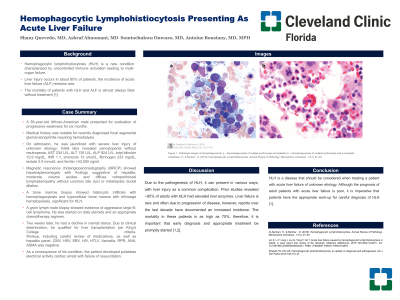Tuesday Poster Session
Category: Liver
P3906 - Hemophagocytic Lymphohistiocytosis Presenting as Acute Liver Failure
Tuesday, October 24, 2023
10:30 AM - 4:00 PM PT
Location: Exhibit Hall

Has Audio

Shany M. Quevedo, MD
HCA East Florida Division
Aventura, FL
Presenting Author(s)
Shany M.. Quevedo, MD1, Ashraf Almomani, MD2, Somtochukwu Onwuzo, MD3, Antoine Boustany, MD, MPH4
1HCA East Florida Division, Aventura, FL; 2Cleveland Clinic Florida, Weston, FL; 3Cleveland Clinic Foundation, Fairview Park, OH; 4Cleveland Clinic Foundation, Cleveland, OH
Introduction: Hemophagocytic lymphohistiocytosis (HLH) is a rare condition characterized by uncontrolled immune activation leading to multi-organ failure. While liver injury occurs in about 85% of patients, the incidence of acute liver failure (ALF) remains rare. The mortality of patients with HLH and ALF is almost always fatal without treatment [1].
Case Description/Methods: A 38-year-old African-American male presented for evaluation of progressive weakness for six months. Medical history was notable for recently diagnosed focal segmental glomerulonephritis requiring hemodialysis. On admission, he was jaundiced with severe liver injury of unknown etiology. Initial labs revealed pancytopenia without neutropenia, AST 234 U/L, ALT 135 U/L, ALP 924 U/L, total bilirubin 10.9 mg/dL, INR 1.1, ammonia 13 umol/L, fibrinogen 233 mg/dL, lactate 2.5 mmol/L and ferritin >43,000 ng/ml. Magnetic resonance cholangiopancreatography (MRCP) showed hepatosplenomegaly with findings suggestive of hepatitis, moderate volume ascites and diffuse retroperitoneal lymphadenopathy without common bile duct or intrahepatic ductal dilation. A bone marrow biopsy showed histiocytic infiltrate with hemophagocytosis and hypocellular bone marrow with trilineage hematopoiesis, significant for HLH. A groin lymph node biopsy showed evidence of aggressive large B-cell lymphoma. He was started on daily steroids and an appropriate chemotherapy regimen. Two weeks later, he had a decline in mental status. Due to clinical deterioration, he qualified for liver transplantation per King’s College criteria. Workup, including careful review of medications, as well as hepatitis panel, CMV, HSV, EBV, HIV, HTLV, Varicella, RPR, ANA, ASMA was negative. As a consequence of his condition, the patient developed pulseless electrical activity cardiac arrest with failure of resuscitation.
Discussion: Due to the pathogenesis of HLH, it can present in various ways, with liver injury as a common complication. Prior studies revealed ~85% of adults with HLH had elevated liver enzymes. Liver failure is rare and often due to progression of disease, however, reports over the last decade have documented an increased incidence. The mortality in these patients is as high as 75%, therefore, it is important that early diagnosis and appropriate treatment be promptly started [1,2].
Disclosures:
Shany M.. Quevedo, MD1, Ashraf Almomani, MD2, Somtochukwu Onwuzo, MD3, Antoine Boustany, MD, MPH4. P3906 - Hemophagocytic Lymphohistiocytosis Presenting as Acute Liver Failure, ACG 2023 Annual Scientific Meeting Abstracts. Vancouver, BC, Canada: American College of Gastroenterology.
1HCA East Florida Division, Aventura, FL; 2Cleveland Clinic Florida, Weston, FL; 3Cleveland Clinic Foundation, Fairview Park, OH; 4Cleveland Clinic Foundation, Cleveland, OH
Introduction: Hemophagocytic lymphohistiocytosis (HLH) is a rare condition characterized by uncontrolled immune activation leading to multi-organ failure. While liver injury occurs in about 85% of patients, the incidence of acute liver failure (ALF) remains rare. The mortality of patients with HLH and ALF is almost always fatal without treatment [1].
Case Description/Methods: A 38-year-old African-American male presented for evaluation of progressive weakness for six months. Medical history was notable for recently diagnosed focal segmental glomerulonephritis requiring hemodialysis. On admission, he was jaundiced with severe liver injury of unknown etiology. Initial labs revealed pancytopenia without neutropenia, AST 234 U/L, ALT 135 U/L, ALP 924 U/L, total bilirubin 10.9 mg/dL, INR 1.1, ammonia 13 umol/L, fibrinogen 233 mg/dL, lactate 2.5 mmol/L and ferritin >43,000 ng/ml. Magnetic resonance cholangiopancreatography (MRCP) showed hepatosplenomegaly with findings suggestive of hepatitis, moderate volume ascites and diffuse retroperitoneal lymphadenopathy without common bile duct or intrahepatic ductal dilation. A bone marrow biopsy showed histiocytic infiltrate with hemophagocytosis and hypocellular bone marrow with trilineage hematopoiesis, significant for HLH. A groin lymph node biopsy showed evidence of aggressive large B-cell lymphoma. He was started on daily steroids and an appropriate chemotherapy regimen. Two weeks later, he had a decline in mental status. Due to clinical deterioration, he qualified for liver transplantation per King’s College criteria. Workup, including careful review of medications, as well as hepatitis panel, CMV, HSV, EBV, HIV, HTLV, Varicella, RPR, ANA, ASMA was negative. As a consequence of his condition, the patient developed pulseless electrical activity cardiac arrest with failure of resuscitation.
Discussion: Due to the pathogenesis of HLH, it can present in various ways, with liver injury as a common complication. Prior studies revealed ~85% of adults with HLH had elevated liver enzymes. Liver failure is rare and often due to progression of disease, however, reports over the last decade have documented an increased incidence. The mortality in these patients is as high as 75%, therefore, it is important that early diagnosis and appropriate treatment be promptly started [1,2].
Disclosures:
Shany Quevedo indicated no relevant financial relationships.
Ashraf Almomani indicated no relevant financial relationships.
Somtochukwu Onwuzo indicated no relevant financial relationships.
Antoine Boustany indicated no relevant financial relationships.
Shany M.. Quevedo, MD1, Ashraf Almomani, MD2, Somtochukwu Onwuzo, MD3, Antoine Boustany, MD, MPH4. P3906 - Hemophagocytic Lymphohistiocytosis Presenting as Acute Liver Failure, ACG 2023 Annual Scientific Meeting Abstracts. Vancouver, BC, Canada: American College of Gastroenterology.
